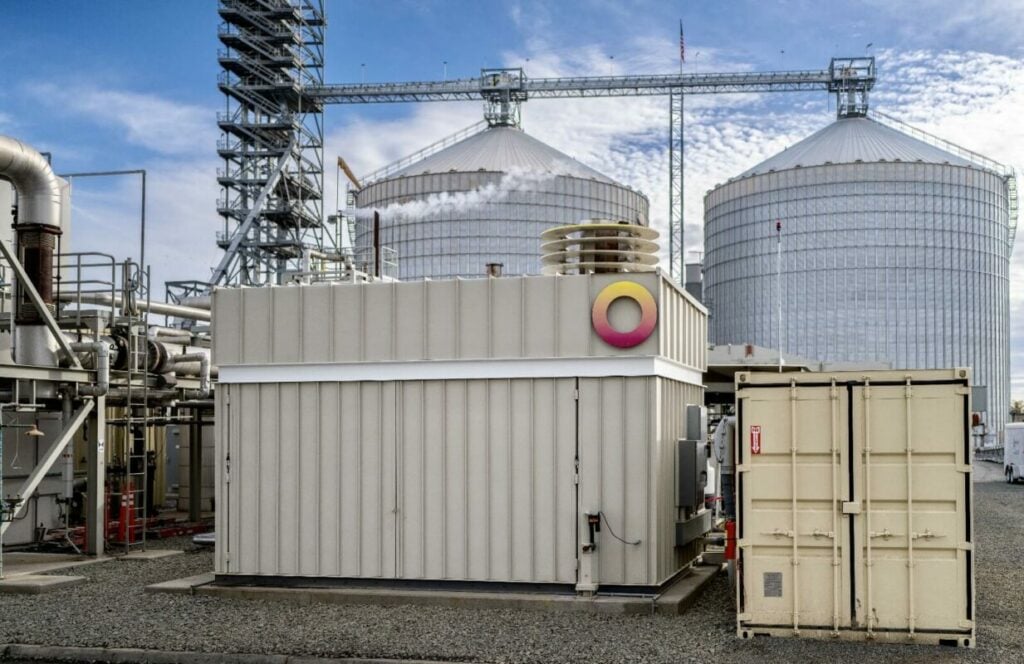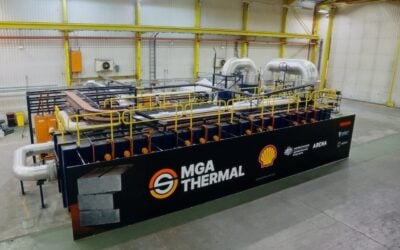
Rondo Energy and SCG Cleanergy have commenced operation of Southeast Asia’s first industrial thermal battery energy storage system (BESS) at SCG’s cement plant in Saraburi, Thailand.
According to the companies, the 33MWh Rondo Heat Battery (RHB) installation is claimed to be the “world’s first commercial heat battery system at a cement manufacturing facility”.
The thermal battery unit integrates with the cement plant’s existing heat recovery system and operates as the world’s only heat battery, driving a steam turbine. The system generates superheated steam that increases the heat recovery turbine’s power output, providing both thermal energy and electricity generation capabilities within the industrial facility’s operations.
US thermal energy storage startup Rondo Energy and SCG Cleanergy, a subsidiary of SCG specialising in clean energy solutions, collaborated to manufacture the unit entirely in Thailand, utilising local supply chains and manufacturing capabilities.
Try Premium for just $1
- Full premium access for the first month at only $1
- Converts to an annual rate after 30 days unless cancelled
- Cancel anytime during the trial period
Premium Benefits
- Expert industry analysis and interviews
- Digital access to PV Tech Power journal
- Exclusive event discounts
Or get the full Premium subscription right away
Or continue reading this article for free
The Thailand deployment follows Rondo Energy’s previous installations, including the recent deployment of a 100MWh industrial heat battery for customer Holmes Western Oil Corporation in California, which is claimed to be the world’s largest industrial heat battery system.
That installation delivers continuous steam powered by off-grid solar energy, demonstrating the technology’s capability to convert intermittent renewable energy into a reliable industrial heat supply.
The Rondo Heat Battery (RHB) system stores electrical energy as high-temperature heat in specialised materials, then releases that thermal energy on demand for industrial processes. A few days after announcing the completion of its California project, Rondo said it had signed contracts for another 100MWh RHB installation, this time for beer company Heineken in Portugal. The system at Heineken’s Vialonga Brewery and Malting Plant will be ‘charged’ directly from a nearby ground-mounted solar PV plant owned by utility EDP.
Rondo’s initial commercial deployment involved a 2MWh system capable of reaching 1,000°C temperatures, establishing the technical foundation for larger-scale industrial applications.
The startup noted that the cement industry represents a potentially significant target market for thermal energy storage solutions, given its high-temperature process requirements and substantial energy consumption.
Cement production typically requires temperatures exceeding 1400°C for clinker formation, making it challenging to electrify using conventional technologies. Thermal battery storage systems offer a pathway to replace fossil fuel combustion with stored renewable energy for these demanding thermal applications.
SCG Cleanergy has indicated plans to develop additional clean industrial heat projects utilising Rondo’s technology to serve other industrial customers. This expansion strategy suggests that growing market demand for thermal energy storage solutions is expected across Southeast Asia’s manufacturing sector.
The Thailand installation occurs as Rondo Energy pursues aggressive scaling plans, including a 90GWh manufacturing ramp-up at its heat battery gigafactory. The company’s production expansion aims to meet increasing demand for industrial decarbonisation solutions across multiple sectors and geographic markets.
The opportunity for industrial thermal energy storage
Industrial thermal energy storage has gained attention as a critical technology for decarbonising heavy industry, particularly in sectors where direct electrification faces technical or economic challenges.
The cement, steel, chemicals, and other energy-intensive industries collectively account for substantial global carbon emissions, making thermal storage solutions increasingly important for climate objectives.
The Southeast Asian market presents opportunities for industrial heat battery deployment, driven by the region’s substantial manufacturing base and growing focus on sustainability initiatives.
Countries across the region have established carbon reduction targets and industrial decarbonisation policies that could drive adoption of thermal energy storage technologies.
Recent industry discussions, including those at the Energy Storage Summit Asia 2025, have highlighted the growing importance of thermal storage solutions alongside traditional battery technologies in addressing diverse energy storage requirements across various applications and markets.





